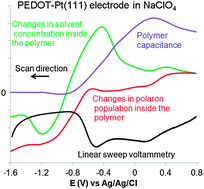The first part of this communication studies the electrochemical properties of thin films of poly(3,4-ethylenedioxythiophene) (PEDOT) grown on the three basal plane platinum electrodes via cyclic voltammetry, chronoamperometry, electrochemical impedance spectroscopy and in situ FTIR spectroelectrochemistry. In the second part of this work the redox reaction of 2,5-dimercapto-1,3,4-thiadiazole (DMcT) at these platinum modified electrodes is investigated via cyclic voltammetry and electrochemical impedance spectroscopy in order to elucidate the effect of some polymer properties on its electrocatalytic behavior, such as the ionic resistance, nature of the doping ion and the structure. First of all, it was found that the ionic resistance of the PEDOT films electrochemically synthesized on platinum electrodes increases in the order Pt(100) < Pt(110) < Pt(111) and the advantages of using single crystal platinum electrodes coated with PEDOT for the IR study of individual mobile species flux and the evolution of charge carriers during the reduction process of p-doped PEDOT were proven. On the other hand, it was found that compact, rigid and low resistance PEDOT films show higher standard charge transfer rates for the DMcT redox reaction than those that have a more porous structure and higher ionic resistance. Finally, PEDOT films doped with alkaline ions are more electrocatalytic for the oxidation process of the protonated form of DMcT.

You have access to this article
 Please wait while we load your content...
Something went wrong. Try again?
Please wait while we load your content...
Something went wrong. Try again?


 Please wait while we load your content...
Please wait while we load your content...